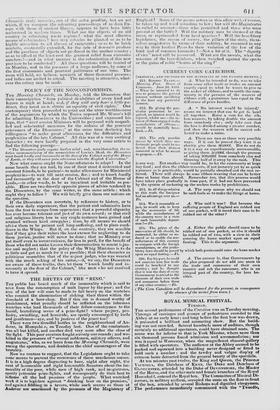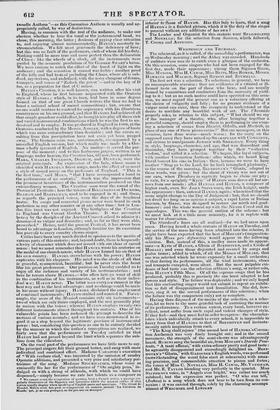ROYAL MUSICAL FESTIVAL.
TUESDAY.
THE second performance of the Creation was on Tuesday morning. Throngs of carriages and groups of pedestrians crowded to the Abbey at an early beer; and long before the first bow was drawn, it presented a brilliant and animating show. But the build- ing was not crowded. Several hundreds more of auditors, though certainly no additional spectators, could have obtained seats. The scene was far inferior to that in York Minster, where more than six thousand persons found admission and accommodation; nor was it equal to Worcester, when the magnificent chancel-gallery is filled with spectators. The audience at the Abbey seemed to be packed and squeezed into a building never designed or fitted to hold such a number : and the tawdry and vulgar disp'ey of crimson baize detracted from the general beauty of the spectacle. At ten minutes past twelve, the King and Queen, the Princess VICTORIA, the Dutchess of KENT, the 'Duke and Dutchess of GLOUCESTER, attended by the Duke of DEVONSHIRE, the Master of the Horse, and the other male and female branches of the Royal Househol 1, entered the Royal box. The Committee of Musical Di- rectors, in military uniform, occupied the seats on the floor in front of the box, attended by several Bishops aod dignified clergymen. The performance immediately commenced with the " Tweedle,
tweedle Anthem "—as this Coronation Anthem is usually and ap- propriately called, by way of distinction. Having, in common with the rest of the audience, to make our election whether to hear de vocal or the instrumental band, we chose, this morning, the latter ; desirous of paying close attention
to, and enjoying almost uninterruptedly, Havinv's masterly in- strumentation. We felt most grievously the deficiency of bass ;
but this was no fault of the performers, each of whom did his duty.
Nothing could be more true and more perfect than the delineation of Chaos: like the wheels of a clock, all the instruments were guided by the accurate pendulum of Sir GEORGE SMART'S baton.
We were curious to watch the effect of the burst of light on the audience; and the sensation it caused was feeble : another proof
of the folly and bad taste of preluding the Chaos, where all is sub- dued, mysterious, and undefined, with the noisy clangour of drums, trumpets, and voices of " Zadoek the priest"—and in the key of D too, as a preparation for that of C minor. HAYDN'S Creation, it is well known, was written after his visit to England, where he first became acquainted with the Oratorio style of HANDEL ; which, in its turn, had been in some degree formed on that of our great Church writers (for then we had to boast a national school of sacred composition) : but, aware that no one could venture to contend for supremacy with his illustrious countryman on his own ground, and that Ira:virtu bad achieved all that simple grandeur could effect, lie brought into play all those rich and varied instrumental combinations which he was the first to Un- dersta ml and to employ. It was produced in England in 1800, at the Oratorios conducted by the Messrs. ASHLEY, with a degree of haste which was more extraordinary than desirable ; and the errors re- sulting from this precipitation have not even yet been purged away. The German score was, unfortunately, accompanied by a miscalled English version, but which really was made by a Ger- man wholly ignorant of English. No matter—it served the pur- pose of the moment ; and to this barbarous jargon, written in no language under heaven, the Creation has, till now, been performed. MARA, CHARLES INCLEDON, DIGNUM, and DENMAN, were the original principals. An expression of the lady, whose name is identified with Ha:am:Cs finest songs, marks the effect of so novel a style of sacred music on the professors of England. "This is the first time," said Mutt, " that 1 have accompanied a band in the performance of an oratorio." Such was the impression that the prominent luxuriance of the instrumentation produced on this extraordinary woman. The Creation soon went the round of the Provincial Festivals : here the talents of BILLINGTON or DICKONS, BRAIT AM and BARTLEMAN, used to be engaged in it; and these, as regards the principal voices, were the days of its brightest lustre. Its songs and concerted pieces never were heard in such perfection in any other country or at any other time: but in Lon- don this treat was not enjoyed. The birthplace of the Creation in England was Covent Garden Theatre. It was accounted heresy by the disciples of the Ancient Concert school to admire it; denounced as vulgar and dramatic; and, as far as they were able, proscribed.* Hence, until the present Festival, it has never been heard to advantage in London, although familiar (as its execution has proved) to every country chorus-singer. Critics have been very much divided in opinion as to the merits of various parts of this oratorio : and, beyond doubt, there is frequently a levity of character which does not accord with our ideas of sacred music : but we must remember that HANCEL Wrote his oratorios on the model of our church music, while HAYDN formed his on that of his own country. HANDEL overwhelms with his power; HAYDN captivates with his elegance. his mind was the abode of all that is graceful, symmetrical, beautiful; but he never stirs the heart like his great predecessor. Our position on Tuesday enabled us to enjoy all the richness and variety of' his instrumentation : and here he towers above Harsnms—who often betrrys want of skill in the combination of his instruments, as well as in their indivi- 'dual use; HAYDN never. The latter uses every insfrument in the best way and to the best advantage; and no change could be made in histscore without injury. Haarost. disdained the employment of combined instruments; HAYDN studied and courted it. For ex- ample, the score of time Messiah contains only six instruments— two of which are only thrice employed, and the rest generally play in unison with the voices ; whereas Maws employs twenty-two different instruments almost throughout his oratorio. One of his vulnerable points has been reckoned the attempt to describe the motions of various animals; and we have been accustomed to re- gard it as a step beyond the legitimate province of instrumental power : but, considering this question as one to be entirely decided by the manner in which the author's conceptions are realized, we fairly own that the performance on Tuesday satisfied us that HAYDN had not passed beyond the limit which separates the sub- lime from the ridiculous.
On the vocal part of the performance we have little more to say. The principal singers felt their ground better, and sung with more individual and combined effect. Madame CARADORI'S execution of "With verdure clad," was improved by the omission of sundry Operatic additions, and presented a very pure and satisfactory por- traiture of the song. Madame STOCKHAUSEN, whose voice so eminently fits her for the performance of " On mighty pens," in- dulged us with a string of adlenda, with which we could have dispensed,—simply because we rate her talents as a composer as • We cannot resist the temptation of quoting, from a French writer, a passage cull- gularly illustrative of the flippancy and ignorance which the musical critics of that nation usually display sten speaking of English poets aryl musicians. •• On ,vivant de Handel. Milton avail fait pour cc compositcur tin oratorio intitule 'La Creation du Monde,' qui, je tie sais pourquoi, no hut pas mis en musique." inferior to those of HAYDN. Has this lady to learn, that a song of HAYDN'S fir a finished picture, which it is the duty of the singer to present without any additions of her own The Leader and Organist for this oratorio were SPAGNOLETTI and NovsaLo; for the selection from Samson, whith followed, T. COOKE and Arrwocin.























 Previous page
Previous page